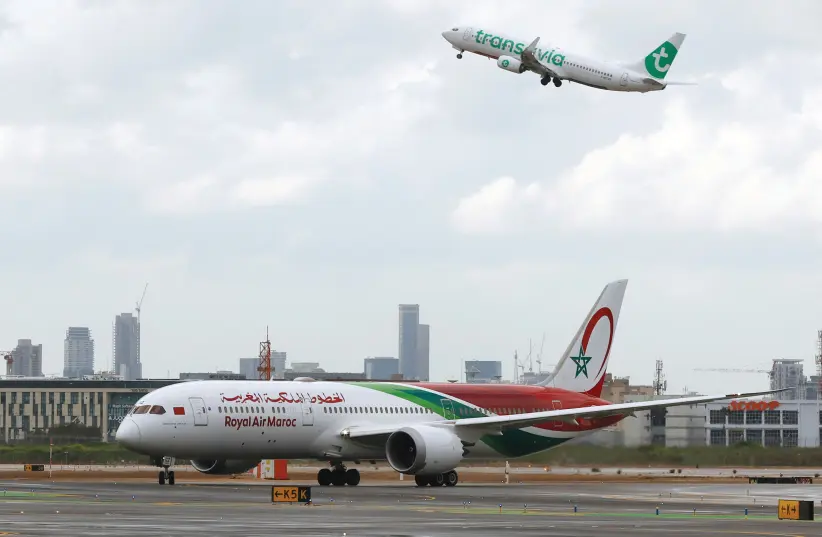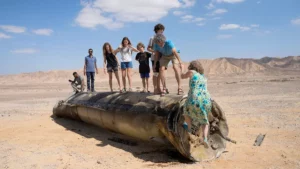Morocco-Israel tourism – not a mirage

The connection between Israel and Morocco runs exceedingly deep. Located at the northwestern edge of Africa, Morocco lies only a few miles away from Europe. For centuries, Morocco served as the link between the two continents.
Due to this particular geographical location, the country was exposed to a myriad of cultural influences. This included the native Berbers, sub-Saharan African Jews, the Romans and the Phoenicians. Later on, Morocco was also influenced by the Arabs, after which came the Portuguese, the Spaniards and, finally, the French. These various ethnic interactions left a huge mark on the country’s culture.
Most of the Sephardi Jews who ended up in Morocco were leaving persecution in Spain and Portugal. After the creation of the State of Israel, hundreds of thousands of Moroccan Jews immigrated to Israel. While Morocco did not have formal diplomatic relations with Israel until 2020, the relationship between the two was secretly maintained after the establishment of Israel in 1948.
Israelis, Morocco and tourism
Thousands of Israelis, both Sephardi and Ashkenazi, have traveled on organized tours for years. With no direct flights, they flew via Istanbul or Paris or Spain. The Moroccan tourism industry has consistently been on a very professional level, and whether it is a kosher tour or a Sahara adventure, they were always very successful trips.
What wasn’t anticipated after official ties were announced in December of 2020 how dramatically it would change the tourism landscape. Once there were nonstop flights between Tel Aviv and Casablanca or Marrakech or Rabat, the desire to visit Morocco reached unparalleled heights.
It was only a few months ago when the COVID-19 pandemic was deemed under control that the flights were initiated. Today, there are almost as many nonstop flights to Morocco as there are to the US. Be it Arkia or Israir, El Al or Whiz Air or Royal Air Maroc, everyone has jumped on the bandwagon.
Morocco was once home to the largest Jewish community in any Arab country. In the mid-20th century, more than 250,000 Jews resided there, but between the 1950s and 1970s the majority of them left for Israel, Europe and North America. Today, about 2,500 Jews are still living in Morocco, most of them in Casablanca.
Earlier this month, I was invited to participate in a delegation of the Association of Israeli Travel Agents. Royal Air Maroc was kind enough to charter an entire plane and nearly 300 Israeli travel agents disembarked at Marrakech. Housing us at a five-star hotel where the Israelis pretty much took over the entire property was just the beginning. Kosher food was arranged for all the participants who required it and the facilities rivaled luxury hotels around the world.
The hotel staff spoke French to each other, and French was used far more often throughout our sojourn than one might expect. France only controlled Morocco for 44 years. From 1912 through 1956 the French ruled Morocco as a protectorate in the days of imperialist time, feeling that an African nation needed their patronage. The same ruling family, specifically Sultan Sidi Mohammed ben Yusef, was restored to power when the French granted the Moroccans their independence. Those 44 years of colonial rule have resonated throughout the years, with French being taught in Moroccan schools.
In Israel, we’ve come to recognize and honor those French Moroccan Jews, who bring a deep respect for their Moroccan background. Many Israeli politicians are proud of their Moroccan heritage.
The history of Moroccan and Jewish residents was one primarily of acceptance and tolerance. Yes, there were instances of antisemitism, but by and large they lived for centuries together. Rabbi Moses Maimonides, one of the most prolific and influential Torah scholars in the Middle Ages, lived in Fez from 1159 to 1165. Originally from Cordoba in Spain, he had fled with his family to escape the persecution of Jews.
It was in Fez that Maimonides, as well as serving as a physician to the sultan, wrote one of his most famous works, his Commentary on the Oral Law. The stone home where he lived still stands.
When the heads of Vichy French came to the sultan during World War II, he was asked a very simple question: “Where are your Jews?” His retort was quite succinct: “We have no Jews here; we are all Moroccans.”
Legend or truth cannot be verified but that was the feeling one got whenever I met with my Moroccan counterparts. In fact, while the evenings were filled with extravagant dinners at palaces and resorts, the highlight for me was sitting down, one by one with the Moroccan tour operators.
It is a huge country with a plethora of tourism sites. Far less expensive than in Europe or in the Emirates the feeling is truly one of stepping into Ali Baba and the Forty thieves. The souk in Marrakech with its snake charmers and entertaining monkeys led me to imagine that Harrison Ford would magically appear.
We were there when Morocco won its World Cup matches, and seeing an entire city celebrate quickly turned all of the Israeli delegates into die-hard Moroccan football fans. While all our evenings were festive, the gala dinner sponsored by El Al was over the top.
The majority owner of El Al, Kenny Rozenberg, and his wife flew into Marrakech to personally thank the Israeli travel agents for keeping El Al afloat and not giving up on them. The night was filled with flame-throwers, henna applications, gymnastic displays and musicians serenading everyone.
The entire kosher feast was redolent of a sultan’s banquet with food and wine being consumed until the wee hours of the morning. Everyone was patting themselves on the back for surviving and now thriving post-pandemic.
FOR A North African country, Morocco does get precipitation. In fact, November to March is considered the rainy season, even if the average is only 2 inches a day. So, while the conference was colorful and cheerful and the platitudes were nonstop, let me put a little rain on the parade.
Most tourism prognosticators believe that 2023 will see a sharp reversal in travel due to recession and inflation issues. While Israel may be the exception to runaway inflation, here too we are witnessing large cutbacks among dozens of Israeli companies.
Surprisingly, to date, future bookings have not yet been canceled, and the first and second quarters of 2023 show no sign of a travel contraction to/from Israel. Still, from an economic perspective it makes sense to pare your staff and cut your costs.
The airline industry along with the entire tourism infrastructure is suffering from a lack of personnel with many providers unwilling to pay the wages needed to maintain their staff.
During the congress, El Al announced that its top 11 executives were to receive millions of shares in El Al stock. This largesse at a time when airlines are concerned about their 2023 earnings can be seen as either vindication of those employees’ hard work during the pandemic or a foolhardy gesture, as shifting to another airline for those lucky employees is not a viable option.
Rozenberg, in his remarks at their gala evening, regaled us with his decision-making process in purchasing El Al.
Deep in the pandemic, with El Al hemorrhaging money and no government assistance, he went to his partner with a thunderbolt.
His partner said he too had a thunderbolt as well, and offered his – to purchase the New York Mets. Rozenberg’s response was to purchase El Al. Which was far less than the Mets were asking and in his professional opinion, a far safer bet. He pointed out that for the price of a single baseball superstar he could purchase a brand-new plane. And it was far easier to fix a jumbo, he cajoled, then to repair an injured baseball player.
In fact just this week, El Al agreed to spend another $230m. on another Boeing Dreamliner. El Al, being a public company, must give its quarterly report. Financial experts will concur that her income is close to reaching pre-pandemic, 2019 levels. However El Al’s debt remains astronomical and betting its future on locking in these employees may come back to haunt El Al.
Everything is coming up roses in the airline industry. El Al is going to fly to Tokyo and Melbourne. Icelandair has announced nonstop flights this summer to Reykjavik, which like Morocco and the Emirates, has Israelis planning trips there like never before. Airline tickets will not return to their pandemic levels. Even with more flights and more competition, one thing is certain: With the demand far outstripping the supply, you will be paying more than you ever did in the past.
For me, Morocco is not a mirage but a country whose land and people are worth a deep collaboration, and if we can keep our unbridled optimism under control it will continue to be a beautiful relationship. Or as I told my Moroccan tour operators: By all means, trust in Allah, but tie your camel first.
Source: The Jerusalem Post





